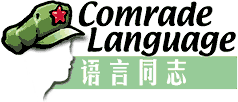|
For those learning Chinese, take comfort that once in
a while the way you say something is the same way we
say something.
Greetings Comrades! Grab your pencils and crayons and
put on your thinking caps, it's time for a few more
pearls of wisdom from your favorite Mandarin Majority
language maven.
The thing to remember about Chinese, linguistically
speaking, is that we decided to go a different route
from a lot of other languages, what with the characters
and the tones and all. So if you want to curse like
a cab driver, be as pedantic as a Party cadre, or practice
the fine art of misleading Mandarin in pursuit of money,
you're going to have to learn a whole lot of words from
scratch. This means more new information to clog your
noggin' for every concept you want to get across.
On the plus side, as a foreigner you'll get "White Boy
(and Girl) Joy" for your ability to say words like "thank
you" and "yes." That is, of course, unless you're of
Chinese extraction and due to geographical reasons (like,
say, having been raised in Louisiana) didn't learn the
tongue from birth, in which case you'll be scoffed at
for your imperfect Chinese until you get, well, perfect.
For anyone learning a foreign language and facing a
sea of new vocabulary, there's comfort in the fact that
every once in a while, the way "they" say something
and the way "we" say something is the same, and learning
new words isn't laborious at all. Chinese has far fewer
points of similarity with English than, say, French
or German. But, because of cultural borrowing over the
past century or so, there are a few words shared in
Han-talk and Anglo-talk:
Ma means mom, just like in English and every other language
known to woman. Be careful how you use it with friends.
ta muqin de che is "his mother's car." Unless you're
very angry you'll want to avoid saying ta ma de accidentally.
It means "His mother's (expletive deleted)."
Ba means pa, or dad. No need to wield this word with
as much care. As in most cultures, while the chances
are good you'll get all your teeth knocked out if you
talk about someone's mother, it's okay to diss their
father.
But let's say you're learning a few new Chinese words
and you get hungry. Hungry for say, a qiaokeli (chocolate)
pai (pie), with bingqilin (ice cream) (qi lin is a transliteration
of "cream"), and maybe some jishi (cheese) on it too.
Afterward you can wolf down a hanbaobao (hamburger)
and zhapi (draught beer) to get that funny cheese taste
out of your mouth.
If this makes your head hurt, take two asipilin (aspirin).
See? You can do this, you're ku (cool). This language
learning business isn't so hard after all.
The stereo's playing some bulusi and some jueshi. You
guessed it, blues and jazz. Now that you're getting
into it, let's have another ting (tin) of beer. Grab
the maikefeng (microphone) - it's time to kala-oukei
(karaoke). You Anglophones borrowed that word from the
Japanese. "Kara" means empty. The "O" in karaoke the
Japanese borrowed to sound like the "O" in "orchestra,"
which the English took from from the French who got
it from Latin, which siphoned it from the Greek word
"orchestrai," which stems from Indo-European "ergh,"
which means swift movement, and sounds uncannily like
the grunts your Comrade makes when he goes for his daily
squat.
Oops, think I just had one beer too many, or was it
that glass of weishiji (whiskey) and kele (Coke) I downed
while you weren't looking? Getting dizzy, feeling xiesidili
(hysterical), losing balance.
This reminds me of the time I spent the night at ba
(bar) and woke up in the morning after a malasong (marathon)
session of pukepai (poker) lying on a red velvet shafa
(sofa) wearing nothing but my BP machine, bipiji (beeper).
What was the name of that place? Club Wonderful, I think.
So many places now called Wandefu. What did they put
in that drink? yapian (opium), hailuoyin (heroin), kekayin
(cocaine)? Who knows.
Whenever I indulge too much, I start imagining that
I'm the incarnation of Sai Xiansheng (Mr. Science) or
De Xiansheng (Mr. Democracy), stalwart symbols of China's
New Culture Movement launched on May 4, 1919. Or I dream
I'm in jianada (Canada) teaching Mandarin on TV where
I have my own xiu (show) and sell products like maple
syrup and Canadian bacon with my smarmy face on the
label. Maybe I'll even turn into a yapi (yuppie), trade
in my pingpangqiupai (ping-pong paddle) and take up
gaoerfu (golf).
As your Comrade, I will try to remember you, gentle
readers, well after I become a big meiti (media) star.
Who knows, maybe I'll be so successful that everyone
in the West will start using Chinese expressions like
tai niu le (too cool, man), to sound hip. Baibaile!
(Bye-bye!)
|


